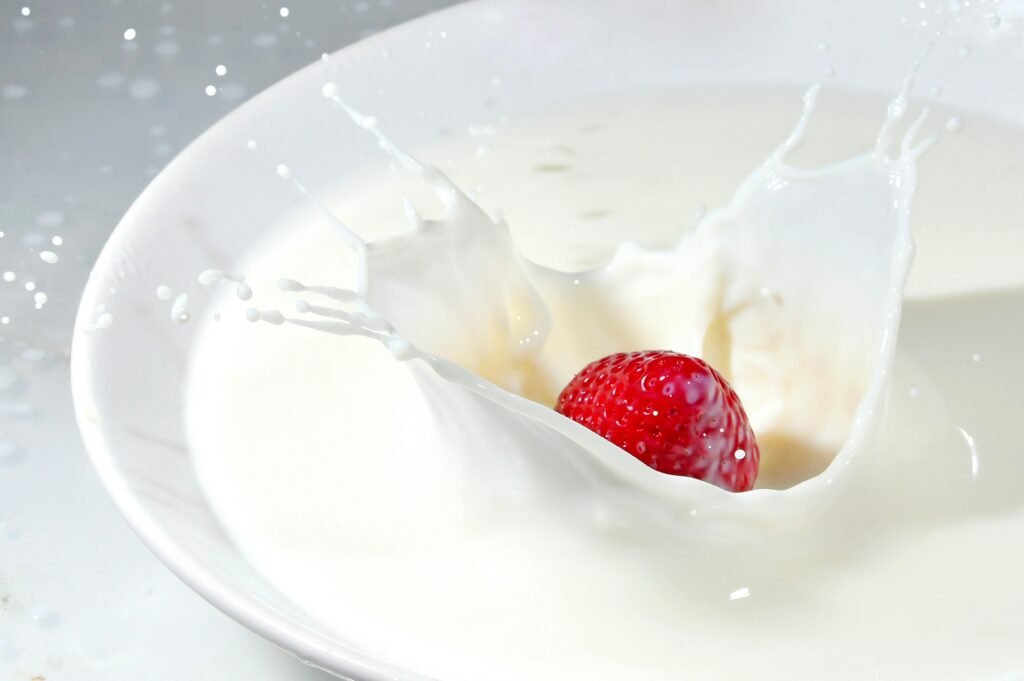Have you ever stopped to think about the magic potion you gulp down every morning? Milk, that seemingly simple beverage, is a treasure trove of nutrients essential for a healthy body. From building strong bones to keeping you energized, milk packs a powerful punch. So ditch the fad diets and embrace the goodness of this natural wonder!
But wait, isn’t milk just for kids? Absolutely not! While milk plays a crucial role in childhood development, its benefits extend far beyond those early years. Whether you’re a fitness enthusiast, a busy professional, or just someone looking to feel their best, milk can be your secret weapon for a healthier you.

Nutritional Profile of Milk
Milk is a powerhouse of essential nutrients that are crucial for maintaining good health. Here’s a breakdown of the key nutrients found in milk and their benefits:
- Calcium: Essential for strong bones and teeth. It also plays a role in blood clotting, muscle contraction, and nerve function.
- Protein: Vital for growth, repair, and maintenance of body tissues. Milk protein contains all the essential amino acids, making it a complete protein source.
- Vitamin D: Helps the body absorb calcium and phosphorus, promoting bone health. It also supports immune function and has anti-inflammatory properties.
- Vitamin B12: Necessary for red blood cell formation, neurological function, and DNA synthesis.
- Potassium: Helps maintain proper heart function and regulates blood pressure by balancing sodium levels in the body.
- Phosphorus: Works with calcium to build strong bones and teeth. It’s also involved in energy production and storage.
- Riboflavin (Vitamin B2): Important for energy production and cellular function.
- Magnesium: Supports muscle and nerve function, blood sugar control, and bone health.
- Zinc: Crucial for immune function, wound healing, and DNA synthesis.
Explore The Milk’s Power On Your Body
1. Milk: Nature’s Powerhouse for Strong Bones From Childhood to Adulthood
For generations, milk has been synonymous with strong bones. The iconic image of a child holding a glass of milk perfectly captures the essential role this beverage plays in building and maintaining a healthy skeletal system. But is milk truly the bone-building champion it’s made out to be? Let’s delve into the science behind milk and its impact on bone health throughout our lives.
The Building Blocks of Strong Bones: A Calcium and Vitamin D Duo
Our bones are the foundation of our body, literally providing structure and support. Milk swoops in like a superhero with a dynamic duo: calcium and vitamin D.
- Calcium: This mineral is the main component of bone, making up around 99% of its structure. Consuming adequate calcium ensures your body has the raw materials it needs to build and maintain strong bones.
- Vitamin D: This sunshine vitamin plays a crucial role in calcium absorption. Without sufficient vitamin D, your body struggles to utilize calcium effectively, hindering bone health.
Milk is a natural source of both calcium and vitamin D, making it a convenient and delicious way to get these essential bone-building nutrients. Many milk varieties are also fortified with additional vitamin D, further enhancing their bone-boosting potential.
Building a Strong Foundation: Milk and Childhood Bone Development
Childhood and adolescence are critical periods for bone development. During this time, peak bone mass is achieved, which essentially represents the strongest your bones will ever be. Adequate calcium intake during this crucial window is essential for laying down a strong foundation for lifelong bone health.
Studies consistently show that children who consume milk regularly have higher bone mineral density compared to those who don’t. This translates to a reduced risk of fractures and osteoporosis later in life.
Maintaining Strength: Milk and Bone Health in Adults
While peak bone mass is achieved in childhood, bone health remains a lifelong concern. As we age, our bones naturally start to lose density, increasing the risk of fractures. Here’s where milk continues to play a valuable role:
- Slowing Bone Loss: Studies suggest that adequate calcium intake, like that found in milk, can help slow down the rate of bone loss associated with aging.
- Promoting Bone Turnover: Milk’s protein content might contribute to healthy bone turnover, a process where old bone tissue is replaced with new.
Milk and Bone Health: Beyond the Basics
While calcium and vitamin D are the superstars, milk offers a symphony of other nutrients that contribute to bone health:
- Vitamin K: Some milk varieties are fortified with vitamin K, which plays a role in bone mineralization.
- Phosphorus: Another essential mineral found in milk, phosphorus works alongside calcium for strong bone structure.
- Protein: Protein intake is crucial for overall bone health, and milk is a natural source of high-quality
2. Milk: The Post-Workout Powerhouse for Muscle Growth and Repair
Milk has long been recognized for its rich nutrient profile, making it a staple in many diets around the world. Beyond its well-known benefits for bone health, milk plays a significant role in muscle growth and repair. This article delves into the science behind milk’s impact on muscle health, exploring its nutritional components, the benefits for athletes and fitness enthusiasts, and practical tips for incorporating milk into your diet for optimal muscle development.
Understanding Muscle Growth and Repair
Muscle growth and repair are continuous processes influenced by various factors, including nutrition, exercise, and rest. When you engage in physical activity, especially resistance training, you create small tears in the muscle fibers. The repair of these fibers is what leads to muscle growth, and this process requires adequate nutrients.
Protein: The Building Block of Muscle
Protein is crucial for muscle growth and repair, and milk provides a balanced combination of casein and whey proteins:
- Whey Protein: Whey is a fast-digesting protein that is quickly absorbed by the body. It is particularly effective for post-workout recovery, providing a rapid influx of amino acids to the muscles. This helps initiate the repair process and stimulates muscle protein synthesis (MPS).
- Casein Protein: Casein is a slow-digesting protein that provides a steady release of amino acids over several hours. This makes it ideal for prolonged periods without food, such as overnight, ensuring a continuous supply of nutrients to the muscles.
Research has shown that the combination of whey and casein proteins in milk can enhance muscle protein synthesis more effectively than either protein alone. This synergistic effect supports both immediate and sustained muscle repair and growth.
The Role of Amino Acids
Amino acids are the building blocks of protein, and milk is rich in essential amino acids (EAAs) that the body cannot produce on its own. Among these EAAs, branched-chain amino acids (BCAAs) such as leucine, isoleucine, and valine are particularly important for muscle growth.
- Leucine: Known as the “trigger” for muscle protein synthesis, leucine plays a critical role in initiating the repair and growth of muscle tissue. Milk is a good source of leucine, making it an effective post-workout recovery drink.
- Isoleucine and Valine: These BCAAs support energy production during exercise and help reduce muscle fatigue.
Carbohydrates for Energy and Recovery
The lactose in milk provides a readily available source of carbohydrates, which are essential for replenishing muscle glycogen stores depleted during exercise. Glycogen is the primary form of stored glucose in muscles and the liver, and adequate glycogen levels are crucial for sustained energy during workouts.
Consuming milk post-exercise helps restore glycogen levels, improving recovery and preparing the muscles for subsequent training sessions. The combination of protein and carbohydrates in milk makes it an ideal recovery beverage, promoting both glycogen replenishment and muscle repair.
Hydration and Electrolytes
Milk also contributes to hydration and electrolyte balance, which are vital for muscle function and recovery. It contains potassium, magnesium, and calcium—electrolytes that help maintain fluid balance, support muscle contraction, and prevent cramping.
Benefits for Athletes and Fitness Enthusiasts
Milk offers several advantages for those engaged in regular physical activity:
- Post-Workout Recovery: The protein and carbohydrate content in milk make it an effective post-workout recovery drink. Studies have shown that milk can enhance muscle recovery and reduce muscle soreness when consumed after exercise.
- Muscle Mass Maintenance: Regular consumption of milk can help maintain muscle mass, particularly in older adults who are at risk of sarcopenia (age-related muscle loss).
- Convenience and Cost-Effectiveness: Milk is a convenient and cost-effective source of high-quality protein, making it accessible to a wide range of individuals, from amateur athletes to professional bodybuilders.

3. Milk: Does it Help or Hinder Weight Management? Separating Myth from Milk
For decades, milk has been associated with weight gain, often finding itself on the “no-go” list of weight loss plans. But is this a fair portrayal? Can milk actually be a part of a healthy weight management strategy? Let’s delve into the science behind milk and its impact on your weight.
Milk’s Potential Benefits for Weight Management
Contrary to popular belief, some studies suggest milk might play a role in healthy weight management. Here’s how:
- Satiety and Reduced Calorie Intake: Milk’s protein content can promote feelings of fullness and satiety. This may lead you to consume fewer calories overall, aiding weight management.
- Calcium and Fat Burning: Calcium, abundant in milk, might influence fat metabolism and potentially promote fat burning, although more research is needed to fully understand this mechanism.
- Muscle Support: The protein in milk helps build and maintain muscle mass. Muscle tissue burns more calories at rest, potentially contributing to a slight increase in your metabolism.
The Importance of Moderation and Choosing the Right Milk
While milk might offer some weight management benefits, it’s crucial to consider these factors:
- Calorie Content: Milk, especially whole milk, contains calories. While not inherently bad, portion control is key.
- Fat Content: Whole milk contains more fat than low-fat or skim milk. If you’re watching your calorie intake, opting for lower-fat milk varieties might be a better choice.
- Lactose Intolerance: If you’re lactose intolerant, consuming milk can lead to digestive issues like bloating and gas, potentially hindering weight management efforts. Lactose-free milk options can be a good alternative.
Milk vs Other Beverages: Weighing the Options
When compared to sugary drinks like soda or juice, milk is a clear winner for weight management. It offers protein and essential nutrients while being significantly lower in sugar. However, water remains the ultimate calorie-free beverage and should be your primary source of hydration.
The Bottom Line: Milk Can Be Part of a Balanced Weight Management Plan
Milk doesn’t deserve a villainous role in weight management. When consumed in moderation and as part of a balanced diet, it can offer some potential benefits. Here are some key takeaways:
- Focus on a Balanced Diet: A healthy diet rich in fruits, vegetables, whole grains, and lean protein is crucial for weight management. Milk can be included as part of this balanced approach.
- Mind Your Portions: Regardless of the milk variety you choose, portion control is essential.
- Listen to Your Body: If you find milk disrupts your digestion or contributes to weight gain, explore lactose-free options or other healthy beverages.
Remember: Weight management is a multifaceted approach. Exercise, healthy eating habits, and adequate sleep are all crucial factors. Milk can be a part of this holistic approach, but it’s not a magic bullet.
Beyond Weight Loss: Milk and Overall Health
While the weight management benefits of milk are a topic of ongoing research, its overall health benefits are well-established. Milk is a powerhouse of nutrients essential for strong bones, healthy muscles, and a well-functioning immune system.
The Final Sip: Milk and Weight Management – A Balanced Approach
Milk can be a healthy addition to a weight management plan when consumed in moderation and as part of a balanced diet. Don’t demonize milk based on outdated information. Instead, focus on portion control, understand your individual needs, and explore the variety of milk options available to find what works best for you. Remember, a healthy and sustainable weight management approach prioritizes overall well-being, and milk can play a supportive role in achieving this goal.
4. Milk and Your Heart: A Moo-veable Feast or a Recipe for Trouble?
For centuries, milk has been a staple beverage, touted for its numerous health benefits. But when it comes to heart health, the picture gets a bit murky. Can milk be your heart’s best friend, or might it be better left on the shelf? Let’s explore the science behind milk and its potential impact on your cardiovascular health.
Milk’s Potential Perks for Your Heart
Milk boasts a variety of nutrients that, in theory, could benefit your heart:
- Calcium Power: This abundant mineral in milk plays a role in regulating blood pressure. Adequate calcium intake has been linked to lower blood pressure readings, a key factor in reducing heart disease risk.
- Potassium Powerhouse: Milk is a natural source of potassium, another mineral crucial for regulating blood pressure and keeping your heart functioning smoothly.
- Vitamin D Duo: Many milk varieties are fortified with vitamin D, which might help lower inflammation and improve blood vessel function, potentially reducing heart disease risk.
- Fat Nuance: While the saturated fat content in whole milk has raised concerns, some studies suggest these fats might not be as detrimental to heart health as previously thought. Additionally, some research suggests dairy consumption, including milk, might be associated with a lower risk of stroke.
The Debate on Milk and Cholesterol: A Complex Web
One of the main concerns regarding milk and heart health is its saturated fat content, which can contribute to elevated LDL (“bad”) cholesterol levels. However, the story isn’t quite so black and white:
- HDL (“Good”) Cholesterol Boost: Milk also contains cholesterol, but the good kind – HDL cholesterol. HDL helps remove LDL cholesterol from your arteries, potentially reducing heart disease risk.
- Dietary Context Matters: Overall dietary patterns play a crucial role. If you consume milk as part of a balanced diet rich in fruits, vegetables, and whole grains, the impact on your cholesterol levels might be less significant.
Milk and Heart Health: Navigating the Research Maze
The research on milk and heart health is ongoing and somewhat complex. Some studies suggest a neutral or even potentially beneficial association between milk consumption and heart disease risk, while others raise concerns about saturated fat content.
Considering Individual Needs: When Milk Might Not Be Your Heart’s BFF
- High Cholesterol: If you already have high cholesterol, particularly LDL cholesterol, discussing milk consumption with your doctor is crucial. They can help you determine the best approach for your individual needs.
- Lactose Intolerance: Lactose intolerance can lead to digestive issues, which can indirectly impact your overall health and well-being. Opting for lactose-free milk eliminates this concern.
- Milk Protein Sensitivities: While less common, some people may experience sensitivity to milk proteins like casein or whey. This can lead to inflammation, which is a risk factor for heart disease.
Finding Your Milk Match for a Healthy Heart
- Variety is Key: Explore different milk options! Consider low-fat or skim milk varieties, which offer the same nutrients but with reduced saturated fat content.
- Plant-Based Alternatives: For those who prefer a vegan or dairy-free lifestyle, some plant-based milk options are fortified with calcium and other heart-healthy nutrients like potassium.
- Focus on a Balanced Diet: Milk can be a part of a heart-healthy diet, but it shouldn’t be the sole focus. Prioritize fruits, vegetables, whole grains, and lean protein sources for optimal heart health.
The Final Sip: Milk and Heart Health – A Conversation with Your Doctor
Milk’s role in heart health is a topic of ongoing research. While the evidence for some potential benefits exists, it’s crucial to consider your individual health profile. Talk to your doctor about your specific needs and risk factors to determine if milk can be a healthy addition to your heart-healthy diet. Remember, a balanced approach to nutrition, regular exercise, and managing stress are all essential ingredients for a healthy heart.
5. Milk and Your Digestive Dance: A Balancing Act
Milk, a childhood staple and a source of comfort for many, boasts an impressive nutritional profile. But when it comes to digestion, milk’s effects can be a bit of a two-step. Let’s delve into the fascinating world of how milk interacts with your gut, exploring both its potential benefits and drawbacks.
The Good Stuff: Milk’s Digestive Benefits
- Lactose Power: Milk’s natural sugar, lactose, acts as a prebiotic. Prebiotics feed the good bacteria in your gut, promoting a healthy gut microbiome. This translates to better digestion, improved nutrient absorption, and a stronger immune system.
- Calcium for a Happy Gut: Calcium, abundant in milk, plays a role in regulating gut muscle contractions, ensuring smooth passage of food and preventing constipation.
- Hydration Hero: Milk contributes to your daily fluid intake, which is crucial for proper digestion. Adequate hydration keeps things moving and prevents constipation.
The Potential Pitfalls: When Milk Upsets Your Stomach
- Lactose Intolerance: This is the big one. Lactose intolerance occurs when your body lacks sufficient lactase, the enzyme needed to break down lactose. This can lead to bloating, gas, cramps, and diarrhea after consuming milk products.
- Milk Protein Sensitivities: Less common than lactose intolerance, some people may experience digestive discomfort due to sensitivity to milk proteins like casein or whey. Symptoms can be similar to lactose intolerance.
- Fat Content: While the fat in whole milk provides satiety and some essential nutrients, it can also slow down digestion for some individuals, leading to sluggishness or discomfort.
Remember: Every body is unique. What works for your friend might not work for you. Experiment, listen to your body, and find the milk option that keeps your digestive system happy and healthy.

6. Milk: Can This Childhood Beverage Uplift Your Mood?
We all know milk is good for building strong bones, but can a glass a day keep the blues away? Recent research suggests a fascinating link between milk consumption and mental well-being. Let’s explore the science behind milk’s potential mood-boosting properties.
A Symphony of Nutrients for a Healthy Mind
Milk is a treasure trove of nutrients, and some may play a crucial role in promoting mental health. Here’s how:
- Brain Food: Milk is a natural source of protein, containing essential amino acids that act as building blocks for neurotransmitters. These neurotransmitters, like dopamine and serotonin, regulate mood, sleep, and feelings of happiness.
- Calcium Power: Calcium isn’t just for bones! Studies suggest it might also influence neurotransmitter function. Adequate calcium intake has been linked to lower stress and anxiety scores and a more positive outlook.
- Vitamin D Sunshine: Milk is often fortified with vitamin D, nicknamed the “sunshine vitamin.” Low vitamin D levels have been associated with depression. While the exact mechanism isn’t fully understood, vitamin D may play a role in regulating mood and brain function.
- B Vitamins for Balance: Milk contains several B vitamins, crucial for energy production and proper nervous system function. Deficiencies in B vitamins can contribute to fatigue, brain fog, and even mood swings.
The Gut-Brain Connection: How Milk Might Impact Mood
The gut microbiome, the community of bacteria residing in your digestive system, plays a surprising role in mental health. Research suggests a two-way street: a healthy gut can influence mood, and stress or anxiety can disrupt gut health.
Milk, with its prebiotics (lactose for those who tolerate it), might contribute to a balanced gut microbiome. This, in turn, could potentially have a positive impact on mental well-being.
The Milk and Mental Health Studies: Promising, But Not Conclusive
Studies investigating the link between milk consumption and mental health are ongoing and show promising results. Some studies suggest a connection between higher dairy intake and lower rates of depression and anxiety. However, more research is needed to fully understand the cause-and-effect relationship.
Important Considerations: When Milk Might Not Be Your Mood Booster
- Lactose Intolerance: If you have lactose intolerance, consuming milk can lead to digestive issues, which can indirectly impact your mood and well-being. Opt for lactose-free milk or explore plant-based alternatives.
- Milk Protein Sensitivities: While less common, some people may experience sensitivity to milk proteins like casein or whey. This can lead to digestive discomfort and potentially contribute to anxiety or mood swings.
- Overall Diet: For optimal mental well-being, a balanced diet rich in fruits, vegetables, whole grains, and lean protein is crucial. Milk can be a part of this healthy diet, but it shouldn’t be the sole
7. Milk: Does it Really Do a Body Good… Especially Your Skin?
For centuries, milk has been touted as a magical elixir for healthy skin. From Cleopatra’s legendary milk baths to homemade face masks passed down through generations, milk’s place in beauty routines seems unshakeable. But does science back up these claims? Let’s delve into the fascinating world of milk and its potential effects on your skin’s health.
Milk: A Potential Ally for Glowing Skin
Milk boasts a variety of nutrients that, in theory, could benefit your skin:
- Lactic Acid Power: Milk contains lactic acid, an alpha hydroxy acid (AHA). AHAs are popular skincare ingredients known for gently exfoliating dead skin cells, promoting cell turnover, and revealing a smoother, brighter complexion.
- Protein Powerhouse: Milk is a natural source of protein, essential for building and repairing skin tissues. Adequate protein intake can contribute to firmer, more elastic skin.
- Vitamin D Duo: Many milk varieties are fortified with vitamin D, which works alongside vitamin A to support skin cell health and potentially reduce inflammation.
- Hydration Hero: Milk contributes to your daily fluid intake, which is crucial for maintaining healthy, plump skin.
But is Topical Milk a Magic Potion? The Reality Check
While the science behind the nutrients in milk is sound, the evidence for topical milk application is less clear-cut. Here’s what you need to consider:
- Limited Research: Studies directly investigating the benefits of topical milk on skin health are scarce. Most research focuses on the internal benefits of consuming milk.
- Potential for Irritation: Raw milk can harbor bacteria that might irritate sensitive skin. Pasteurized milk is a safer option, but it still lacks the controlled environment of a formulated skincare product.
- Hygiene Concerns: Leaving milk on your face for extended periods can create a breeding ground for bacteria, potentially leading to breakouts.
So, Should You Ditch the Milk Face Mask?
Not necessarily! While milk itself might not be a miracle cure, it can be a fun and potentially beneficial addition to your skincare routine – with a few precautions:
- Keep it Simple: Opt for short milk compresses using chilled, pasteurized milk. Apply for a few minutes and rinse thoroughly with cool water.
- Patch Test First: Test a small amount of milk on your inner forearm before applying it to your face. This helps identify any potential sensitivities.
- Don’t Ditch Your Regular Regimen: Milk can be a hydrating and potentially exfoliating addition, but it shouldn’t replace your regular cleanser, moisturizer, and sunscreen.
Milk You Can Drink for Healthy Skin: A More Reliable Approach
Here’s where the science gets more interesting! Consuming milk might offer more consistent benefits for your skin’s health:
- Hydration from Within: As mentioned earlier, proper hydration is crucial for plump, healthy skin. Milk contributes to your daily fluid intake, keeping your skin hydrated from the inside out.
- Nutrient Power: The vitamins, minerals, and protein found in milk can support skin health by providing the building blocks for healthy skin cells and potentially reducing inflammation.
Remember: Moderation is key. While milk can be a part of a healthy diet, consult a healthcare professional if you have any concerns about dairy consumption.
The Final Milk Mustache: A Balanced Approach to Skin Health
Milk, whether consumed or used topically with caution, might offer some benefits for your skin. However, it’s not a one-stop solution. Here are some key takeaways:
- Focus on a Balanced Diet: A diet rich in fruits, vegetables, whole grains, and lean protein provides essential nutrients for healthy skin. Milk can be a part of this balanced approach.
- Prioritize Proven Practices: Cleansing, moisturizing, and sun protection are the cornerstones of a healthy skincare routine. Milk can be a complementary addition, but not a replacement.
- Listen to Your Skin: If topical milk irritates your skin, discontinue use and explore other options
Different Types of Milk and Their Benefits
Milk comes in various forms, each offering unique benefits:
- Cow’s Milk: The most common type, rich in calcium, protein, and essential vitamins.
- Goat’s Milk: Easier to digest for some people and contains slightly more protein and calcium than cow’s milk.
- Plant-Based Milks: Plant based milk options like almond, soy, and oat milk provide alternatives for those who are lactose intolerant or follow a vegan diet. These can be fortified with vitamins and minerals to match the nutritional profile of cow’s milk.
Common Concerns About Milk Consumption
While milk offers numerous health benefits, some people may have concerns about its consumption:
- Lactose Intolerance: Many people cannot digest lactose, the sugar found in milk. Lactose-free milk and dairy alternatives can provide a solution.
- Milk Allergies: Some individuals are allergic to the proteins in milk. For these people, it’s essential to find alternative sources of calcium and other nutrients.
- Saturated Fat: Whole milk contains saturated fat, which can raise cholesterol levels. Opting for low-fat or fat-free versions can mitigate this concern.
Let’s dive into the magnificent world of milk and explore its superpowers!

Delicious Ways to Incorporate Milk into Your Daily Meals
Milk: a childhood staple, a source of comfort, and a nutritional powerhouse. But let’s face it, a plain glass of milk can get a bit monotonous. The good news is, milk’s versatility extends far beyond the breakfast table. Let’s explore creative and delicious ways to incorporate milk into your daily meals, transforming it from a simple beverage to a culinary superstar.
Breakfast Beyond Cereal: A Milky Morning Transformation
- Smoothie Sensation: Ditch the juice and blend your favorite fruits, yogurt, and milk for a creamy and satisfying breakfast smoothie. Add a scoop of protein powder for an extra boost.
- Oatmeal Cream Dream: Ditch the water and cook your oatmeal with milk for a richer, creamier texture. Top it with nuts, seeds, and fruit for a complete and delicious breakfast.
- French Toast Fantasy: Soak your bread in a mixture of eggs, milk, and cinnamon for a decadent French toast experience. Enjoy with fresh berries and a drizzle of maple syrup.
Lunchtime Delights: Milky Makeovers for Midday Meals
- Soup-er Creamy: Elevate your favorite soups by replacing water or broth with milk. This adds a touch of creaminess and enhances the flavor profile.
- Delectable Dips: Ditch the mayo and create healthy dips for your vegetables or crackers using milk, yogurt, and your favorite herbs and spices.
- Quiche Lorraine Love: Milk is a key ingredient in quiche fillings, creating a smooth and custard-like texture. Experiment with different vegetables and cheeses for endless flavor combinations.
Dinnertime Magic: Unveiling Milk’s Culinary Potential
- Creamy Sauces: Milk forms the base for countless creamy sauces, perfect for pasta dishes, casseroles, and gratins. Add cheese, herbs, and spices to create your own signature sauce.
- Mashed Potato Marvels: Swap water or butter for milk when mashing potatoes. This creates a lighter and creamier texture, perfect for soaking up gravy or your favorite toppings.
- Scallops in a Milky Dream: Seared scallops bathed in a creamy milk sauce with a touch of herbs are a restaurant-worthy dish you can easily create at home.
Beyond the Savory: Sweet Treats with a Milky Touch
- Pancake Perfection: Replace water with milk in your pancake batter for fluffy and flavorful pancakes. Top them with fresh fruit, whipped cream, or maple syrup.
- Custard Creations: Homemade custard is a simple yet delightful dessert. Milk is the base for this creamy treat, flavored with vanilla, nutmeg, or your favorite spices.
- Milkshakes Made Easy: Blend your favorite ice cream with milk for a classic and refreshing milkshake. Add fruit, chocolate syrup, or peanut butter for a customized flavor explosion.
Remember: Variety is Key!
- Explore Different Milk Options: Lactose-free, low-fat, whole milk, and plant-based milk alternatives all offer a variety of benefits and flavors. Experiment and find what works best for your taste and dietary needs.
- Think Beyond the Glass: Milk isn’t just for drinking! Use it in cooking, baking, and creating delicious sauces to add creaminess, flavor, and essential nutrients to your meals.
The Final Sip: A World of Flavor with Milk
Milk goes far beyond a simple beverage. With a little creativity, you can transform milk into a culinary chameleon, adding richness, flavor, and versatility to your daily meals. So, ditch the bland and explore the endless possibilities of incorporating milk into your diet. After all, a little moo can go a long way in creating delicious and nutritious meals!
Remember, variety is key! Experiment with different milk options to find what suits your taste and dietary needs.
The Bottom Line: Milk Makes a Magnificent Addition to Your Diet
Milk is a natural powerhouse beverage loaded with essential nutrients for a healthy body. From building strong bones.




Hiya, I’m really glad I’ve found this information. Today bloggers publish just about gossips and internet and this is actually frustrating. A good site with exciting content, this is what I need. Thanks for keeping this web-site, I will be visiting it. Do you do newsletters? Can not find it.